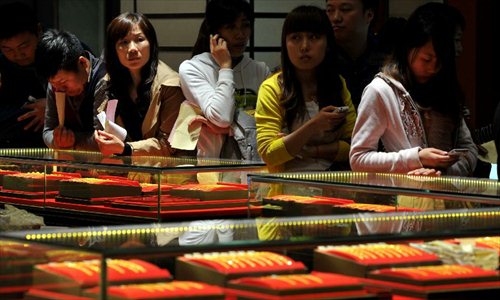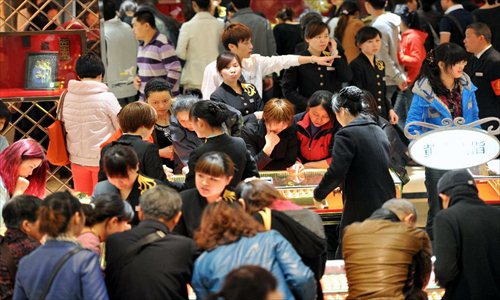Gold price freefall prompts "gold rush"


Gold purchases are picking up speed following a recent abrupt price drop for the precious metal.
Gold bars have sold out and gold accessories are going fast at the Caishikou Department Store, the largest gold dealer in downtown Beijing.
"No gold bars are available. Customers who have paid can pick up their bars in one week," said a notice posted at the store's gold sales counter.
Gold had almost exclusively been purchased by wealthy Chinese before the prices plummeted. But with prices dropping significantly, those with lesser means have seen an opportunity to invest in the metal themselves.
"I couldn't wait to buy gold. Many of my colleagues and friends have already made their purchases," said Zhang Jiang, a Beijinger who bought two gold necklaces and a five-ounce gold bar.
Zhang said he expects to make up his losses on the depressed stock and fund markets by gaining some profit in the gold market.
Caishikou was selling gold jewelry for 378 yuan (about 61.16 US dollars) per gram on Thursday, more than 30 yuan less than the price it posted during the Spring Festival holiday in February.
Gold futures on the COMEX division of the New York Mercantile Exchange suffered their biggest one-day decline since the 1980s on Monday.
Prices saw their biggest one-day percentage drop since February 1983. Gold's one-day dollar drop was the biggest since January 1980 and the second-largest in its history.
INVESTMENT PROSPECTS
At a gold store in east China's city of Nanjing, one local resident rushed to buy 10 kg of gold at a total price of 2.9 million yuan, the Xiandai Express reported.
Many people have lined up at local gold stores to purchase large amounts of jewelry and gold bars, the paper reported.
A local resident surnamed Sun said she purchased gold bars for less than 300 yuan per gram several years before, although she did not sell them when gold prices reached 380 yuan per gram last year.
Gold has become more popular as an investment option in China, as some believe it is immune to inflation. Gold consumption surged to 832.18 tonnes last year, a 9.35 year-on-year increase.
Jewelry purchases totaled 502.75 tonnes, a 10.09 year-on-year increase, the China Gold Association said.
"The gold price slump gives common Chinese with a window to use their increasing wealth and boost investment," said Feng Yongsheng, a researcher with the National Academy of Economic Strategy under the Chinese Academy of Social Sciences.
Investment channels remain somewhat limited in China, with those of means looking to unorthodox markets to help their money appreciate. In recent years, jade, pear wood and even agricultural products like garlic and mung beans have all been the target of speculation.
Although gold has significantly greater investment value, it also has great potential risk, Feng said.
"A large number of financial institutions and researchers believe that gold is greatly overvalued. The decade-long bull market for gold seems to have reached an end," said Zhao Qingming, an expert in international finance.